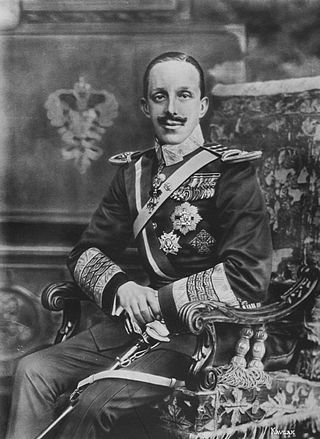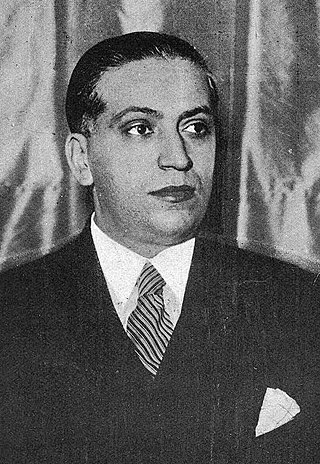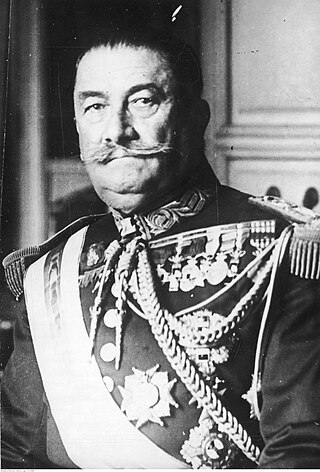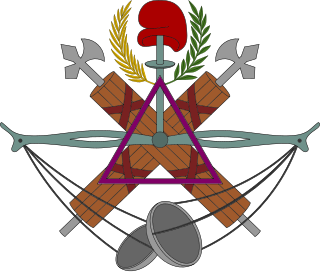| |||||
| Decades: | |||||
|---|---|---|---|---|---|
| See also: | Other events of 1917 List of years in Spain | ||||
Events in the year 1917 in Spain .
| |||||
| Decades: | |||||
|---|---|---|---|---|---|
| See also: | Other events of 1917 List of years in Spain | ||||
Events in the year 1917 in Spain .


Alfonso XIII, also known as El Africano or the African for his Africanist views, was King of Spain from his birth until 14 April 1931, when the Second Spanish Republic was proclaimed. He became a monarch at birth as his father, Alfonso XII, had died the previous year. Alfonso's mother, Maria Christina of Austria, served as regent until he assumed full powers on his sixteenth birthday in 1902.

José Calvo Sotelo, 1st Duke of Calvo Sotelo, GE was a Spanish jurist and politician. He was the minister of finance during the dictatorship of Miguel Primo de Rivera and a leading figure during the Spanish Second Republic. During this period, he became an important part of Spanish Renovation, a monarchist movement. Calvo Sotelo's assassination in July 1936 by the bodyguard of PSOE party leader Indalecio Prieto was an immediate prelude to the triggering of the Spanish military coup of July 1936 that was plotted since February 1936, the partial failure of which marked the beginning of the Spanish Civil War.

Dámaso Berenguer y Fusté, 1st Count of Xauen was a Spanish general and politician. He served as Prime Minister during the last thirteen months of the reign of Alfonso XIII.

The Restoration or Bourbon Restoration was the period in Spanish history between the First Spanish Republic and the Second Spanish Republic from 1874 to 1931. It began on 29 December 1874, after a coup d'état by General Arsenio Martínez Campos ended the First Spanish Republic and restored the monarchy under Alfonso XII, and ended on 14 April 1931 with the proclamation of the Second Spanish Republic.

The Radical Republican Party, sometimes shortened to the Radical Party, was a Spanish Radical party in existence between 1908 and 1936. Beginning as a splinter from earlier Radical parties, it initially played a minor role in Spanish parliamentary life, before it came to prominence as one of the leading political forces of the Spanish Republic.

Álvaro de Figueroa y Torres, 1st Count of Romanones was a Spanish politician and businessman. He served as Prime Minister three times between 1912 and 1918, president of the Senate, president of the Congress of Deputies, Mayor of Madrid and many times as cabinet minister. He belonged to the Liberal Party. Romanones, who built an extensive political network, exerted a tight control on the political life of the province of Guadalajara during much of the Restoration period. He also was a prolific writer, authoring a number of history essays.

Manuel García Prieto, 1st Marquis of Alhucemas was a Spanish politician who served as prime minister several times in his life and as the 30th Solicitor General of Spain. He was a member of the Liberal Party. During his last term, he was deposed by Miguel Primo de Rivera.

Spain remained neutral throughout World War I between 28 July 1914 and 11 November 1918, and despite domestic economic difficulties, it was considered "one of the most important neutral countries in Europe by 1915". Spain had maintained a non-aligned stance during the political difficulties of pre-war Europe, and continued its neutrality after the war until the Spanish Civil War began in 1936. While there was no direct military involvement in the war, German forces were interned in Spanish Guinea in late 1915.

Álvaro de Albornoz y Liminiana was a Spanish lawyer, writer, and one of the founders of the Second Republic of Spain.

The Spanish Republican Army was the main branch of the Armed Forces of the Second Spanish Republic between 1931 and 1939.

The Spanish Republican Navy was the naval arm of the Armed Forces of the Second Spanish Republic, the legally established government of Spain between 1931 and 1939.

Manuel Senante Martínez (1873–1959) was a Spanish Traditionalist politician and publisher, until 1931 adhering to the Integrist current and afterwards active in the Carlist ranks. He is known mostly as the longtime editor-in-chief of the Madrid daily El Siglo Futuro (1907–1936). During 8 consecutive terms he served as the Integrist deputy to the Cortes (1907–1923).
Events in the year 1912 in Spain.
The Crisis of 1917 is the name that Spanish historians have given to the series of events that took place in the summer of 1917 in Spain. In particular, three simultaneous challenges threatened the government and the system of the Restoration: a military movement, a political movement and a social movement. These events coincided with a number of critical international events that same year. However, in world history this period is not typically referred to as a crisis, and the term is instead reserved for specific issues relating to World War I, such as the conscription crisis in Canada and the crisis of naval construction in the United States. Spain remained neutral throughout the conflict.
Events in the year 1918 in Spain.

José Francos Rodríguez was a Spanish politician and journalist. He served as Mayor of Madrid as well as Minister of Public Instruction and Fine Arts and Minister of Grace and Justice during the reign of Alfonso XIII.

The Dictablanda of Dámaso Berenguer, or Dámaso Berenguer's dictatorship was the final period of the Spanish Restoration and of King Alfonso XIII’s reign. This period saw two different governments: Dámaso Berenguer’s government, formed in January 1930 with the goal of reestablishing “constitutional normalcy” following Primo de Rivera’s dictatorship, and President Juan Bautista Aznar’s government, formed a year later. The latter paved the way to the proclamation of the Second Spanish Republic. The term dictablanda was used by the press to refer to the ambivalence of Berenguer’s government, which neither continued the model of the former dictatorship nor did it fully reestablish the 1876 Constitution.
The 1917 Spanish general strike, or revolutionary general strike of 1917, took place in Spain in August 1917. It was called by the General Union of Workers (UGT) and the Spanish Socialist Workers' Party (PSOE), and in some places it was supported by the National Confederation of Labor (CNT). The general strike took place in the historical context of the Crisis of 1917, during the reign of Alfonso XIII and the government of Eduardo Dato.

Alfonso XIII became King of Spain at the moment of his birth in May 1886 because his father, Alfonso XII, had died five months earlier. His mother, Maria Christina of Austria, was regent until May 1902, when he turned sixteen and took the oath of office under the Constitution of 1876, when he began his personal reign, which lasted until 14 April 1931, when he had to go into exile after the proclamation of the Second Republic.
The Picasso File is the name given to the report written by General Juan Picasso, assigned to the Supreme Council of War and Navy, the highest body of military jurisdiction, in relation to the events that took place in the General Command of Melilla in the months of July and August 1921, known as the "Annual Disaster".